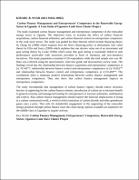| dc.contributor.author | Kirabo, Noah B. | |
| dc.date.accessioned | 2018-11-05T09:17:43Z | |
| dc.date.available | 2018-11-05T09:17:43Z | |
| dc.date.issued | 2013 | |
| dc.identifier.citation | Kirabo, N. B. (2013). Carbon Finance Management and Entrepreneurs’ Competence in the Renewable Energy Sector in Uganda: A Case Study of Ugastove-Cook Stove Cluster Project. Uganda Martyrs University, Nkozi: Uganda Martyrs University. | en_US |
| dc.identifier.uri | http://hdl.handle.net/20.500.12280/975 | |
| dc.description.abstract | KIRABO .B. NOAH (2013-M102-20065)
Carbon Finance Management and Entrepreneurs’ Competence in the Renewable Energy Sector in Uganda: A Case Study of Ugastove-Cook Stove Cluster Project.
The study examined carbon finance management and entrepreneur competence in the renewable energy sector in Uganda. The objectives were; to examine the effect of carbon financial acquisitions, carbon financial utilisation, and carbon financial control on entrepreneur competence in the cook stove sector. The study was guided by three theories which include financing theory by Zhang Jie (2008) which explains how the firm's financing policy is determined, best value theory by Ellis and Garry (1990) which explains that one derives value out of an investment and goal setting theory by Locke (1960) which states that goal setting is essentially linked to task performance achievable with incentives provided in form of monetary and non-monetary incentives. The study population consisted of 50 respondents while the total sample size was 40. Data was collected using the questionnaire, interview guide and documentary review tools. The findings reveal that the relationship between finance acquisition and entrepreneur competence at (r) =0.345**, relationship between finance control and entrepreneur competences at (r) =0.652** and relationship between finance control and entrepreneur competence at (r)=0.493**. The correlations show a moderate positive relationship between carbon finance management and entrepreneur competence. They also show that carbon finance management impacts on entrepreneur competence.
The study recommends that management of carbon finance registry should reduce inclusion barriers in registering for the carbon finance scheme, introduction of carbon tax to increase benefit to general economy and managerial training for entrepreneurs to increase utilisation, mobilisation and control. Also carbon finance management should explore the financial implications of living in a carbon constrained world, a world in which emissions of carbon dioxide and other greenhouse gases carry a price. This calls for stakeholder engagement in the supporting of the renewable energy products through carbon finance since the clean energy options available are expensive for the middle class in Ugandan to acquire and use.
Key Words: Carbon Finance Management, Entrepreneurs’ Competence, Renewable Energy Sector, Ugastove-Cook Stove Cluster Project. | en_US |
| dc.language.iso | en | en_US |
| dc.publisher | Uganda Martyrs University | en_US |
| dc.subject | Carbon Finance Management | en_US |
| dc.subject | Entrepreneurs’ Competence | en_US |
| dc.subject | Renewable Energy Sector | en_US |
| dc.subject | Ugastove-Cook Stove Cluster Project | en_US |
| dc.title | Carbon Finance Management and Entrepreneurs’ Competence in the Renewable Energy Sector in Uganda: A Case Study of Ugastove-Cook Stove Cluster Project. | en_US |
| dc.type | Thesis | en_US |


